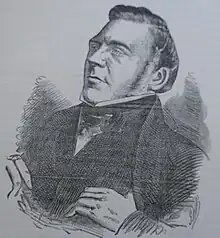George Edmonds (lawyer)
George Edmonds (10 March 1788 – 1 July 1868) was an English teacher, lawyer, and scholar. He is principally remembered for his book A Universal Alphabet, Grammar, and Language. He was also a reforming journalist and leading Radical.
George Edmonds | |
|---|---|
 | |
| Born | 1788 |
| Died | 1 July 1868 |
| Resting place | Key Hill Cemetery |
| Occupation | Lawyer, schoolmaster, politician |
Life
Edmonds was the son of Edward Edmonds, the Baptist minister of the Bond Street Chapel in Birmingham, and his second wife Sarah Bromfield. He was educated by his father, and then set up a school.[1]
He became Birmingham's first Clerk of the Peace when that town was incorporated as a borough.[2]
In 1812 he supported Thomas Attwood's campaign against orders in council. Later in the decade he was involved in agitation over the poor law administration. In 1819 he was one of those indicted for the gesture of proposing Sir Charles Wolseley as a local representative of Birmingham, which had no Member of Parliament. In the end Edmonds spent a year imprisoned[2] in Warwick Castle. In the 1830s he was active in the Birmingham Political Union.[1][2]
Edmonds married twice, the second time at the age of 79. He died at Abington Abbey near Northampton on 1 July 1868,[2] and was buried at Key Hill Cemetery, Hockley, Birmingham.[1][3]
Works
A Universal Alphabet, Grammar, and Language enlarges upon John Wilkins's earlier An Essay towards a Real Character and a Philosophical Language. Edmonds proposed that one of the reasons for the nonadoption of Wilkins' universal language was that it was too hard to pronounce and that the words were too ugly when pronounced. He accordingly proposed a modified pronunciation system for the language.
References
- Edwards, Eliezer (1877). Personal Recollections of Birmingham and Birmingham Men. Birmingham, England: Midland Educational Trading Company Ltd.
Notes
- Thomas, Susan. "Edmonds, George". Oxford Dictionary of National Biography (online ed.). Oxford University Press. doi:10.1093/ref:odnb/74226. (Subscription or UK public library membership required.)
- Thomas T. Harman (1885), Showell's Dictionary of Birmingham: A history and guide, arranged alphabetically: containing thousands of dates and references to matters of interest connected with the past and present history of the town – its public buildings, chapels, churches and clubs – its Friendly Societies and Benevolent Associations, philanthropic and philosophical institutions – its colleges and schools, parks, gardens, theatres, and places of amusement – its men of worth and noteworthy men, manufactures and trades, population, rates, statistics of progress, &c., &c., Cornish Brothers, p. 179, Wikidata Q66438509
- Manning, E. H. (1924) [1915]. Handbook of the Birmingham General Cemetery: together with biographical notes on those interred therein. Birmingham: Hudson & Son. p. 27. Archived from the original on 17 March 2016. Retrieved 2 November 2016.
External links
- A Universal alphabet, grammar, and language : comprising a scientific classification of the radical elements of discourse : and illustrative illustrations from the Holy Scriptures and the principal British classics : to which is added, a dictionary of the language, George Edmonds, 1856, London; Glasgow : Richard Griffin